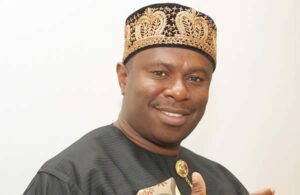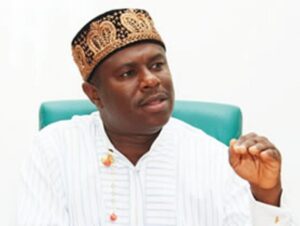2023: Reflections and future outlooks
By Dakuku Peterside
The passing 2023 was a year of significance for Nigeria’s political and economic landscape. Reflecting on the year underscores the need for heightened vigilance against the emergence of small ,yet consequential political challenges that threaten our democratic fabric. Domestically, the ascent of Peter Obi and the Labour Party during the 2023 elections signals the ongoing momentum of our democracy. The rise of a populist candidate post–Buhari indicates a desire by some Nigerians to have a radical change and depart from the orthodoxy. The successful transition from the Buhari administration to the Bola Tinubu administration is a commendable milestone because the consistent adherence to periodic elections, a pivotal democratic pillar, has been sustained for five consecutive terms since 1999.
However, these achievements are marred by localised challenges. Instances in the states of Ondo, Edo, and Rivers reveal that issues were less about state development and more about upholding the rule of law, respecting democratic principles, the rise of strongmen, and the absence of consensus-building. Politics of cronyism and clientelism is still prevalent. Leadership at the state level is crucial to the development of Nigeria. The paucity of leadership at the grassroots level in Nigeria is our bane. Furthermore, a critical concern that requires attention is the judiciary’s role in fortifying democracy, with Kano State emerging as a potential litmus test. These seemingly isolated issues, though apparently benign, have the potential to converge into a more significant threat to national cohesion and democracy, with historical lessons offering stark reminders. We must pay attention to these localised “cancers” before they spread, causing national political upheaval.
Nigeria found itself confronted by deep-seated issues because of ethnic and geopolitical tensions, rendering the resolution of national problems increasingly complex and, at times, impossible. Through 2023, there are pockets of mass killings by bandits across some Northern regions and secessionist brouhaha in the South- East. Even lately, some communities in Plateau State were ravaged by suspected bandits and over one hundred people were murdered with no consequences. Kidnapping is rampant across major cities in Nigeria. The Southeast states shot down every Monday without economic activities because of fear of reprisals from groups enforcing sit-at-home orders.
The general elections were fought along ethnic and religious lines; prominent candidates resorted to exploiting divisive narratives to secure support, detrimentally impacting the overall fabric of national unity. The aftermath of the elections revealed a persistent reluctance among Nigerians to unite and a preference for clinging to ethnic identities over fostering national cohesion. This inclination became glaringly evident in the election campaigns’ content, tone, and themes, further contributing to the widening ethnic fault lines. However, Atiku Abubakar, former VP, argues that ethnicity and religion are not our main problems but symptoms of absence of leadership and negative attitude. He posits, “Nigeria’s problem is not ethnic or religious. It is systemic. It is the leadership system. It is an attitude problem.” It is only leaders that perpetuate and stoke the fire of ethnicity and religion for political gains.
On the economic front, three noteworthy events posed hurdles to the deepening of democracy: the Naira redesign amid elections, rampant inflation, and the near collapse of the Naira against the dollar, eroding the national currency’s purchasing power and exacerbating poverty. The pervasive cost-of-living crisis is disproportionately affecting most of the middle- and low-income earners, aggravating the inequalities gap . People experiencing poverty are more economically vulnerable, with inflation reaching alarming levels, pushing staple prices up. The escalating Dollar rate is disturbing. 2023 started with $ exchanging rate of about N460/N in the parallel market. It ended with $1 exchanging at over N1200 — further compounding the issue and causing a ripple effect on the prices of various goods. The removal of the subsidy on Premium Motor Spirit (PMS) forced an increase in fuel price to about N600 against about N190 it was earlier in the year. The rise in fuel prices and the concomitant increase in transport costs has profoundly affected commodity prices in the market, whilst the income of most Nigerians remains stagnant, and the palliative measures are proving inadequate to cushion the harsh effects.
Insecurity directly correlates with food security. The prevailing insecurity in the country worsened the already cost of living crisis Nigerians faced. Many farmers faced hindrances in cultivating and harvesting crops due to insecurity and other forces, causing disruptions in the national food-producing regions. Addressing the national food insecurity challenge is a sine qua non. The government must find solutions to the undue pressure the farmers face nationwide due to the siege of insecurity .
On the global stage, the Israel-Hamas conflict resisted international intervention, and the Russia-Ukraine war posed a substantial threat to the worldwide economy. Nigeria is not insulated from the vagaries of global economic upheavals. When the world coughs, Nigeria catches a cold. We must be prepared to deal with these global uncertainties and develop structures and systems to serve us in adverse global economic impacts. We must not allow ourselves to be docile victims at the mercy of global crisis. Instead, we must be bullish and active participants hoping to take advantage of such a global crisis presents.
Collectively, these challenges constitute unenviable markers of our current reality, carrying profound implications for Nigeria’s political and economic growth. Extrapolating from these “fires,” it becomes evident that substantial efforts are needed to foster deeper democracy. Political crises in Rivers, Ondo, and Edo underscore the fragile nature of our democracy and the imperative of respecting the rule of law. In the future, eternal vigilance is the price to secure democracy. The economy, regrettably, appears even more fragile, raising questions about whether deliberate actions have led to its erosion for the benefit of the political elite. Nigeria’s former President, Goodluck Jonathan, argues, “We need to correct our politics; we need to correct our economics. We need to correct everything that was wrong.”
As we step into 2024, the paramount concern and developmental priority for the government should be fostering unity among Nigerians. A national peace and unity dialogue is imperative now, aiming to address the divisive lines that have emerged over the years. It is essential to plan and convene a national meeting, engaging in discussions that focus on healing the nation and redesigning governance structures to ensure the equitable delivery of democracy’s dividends to all Nigerians. Rebuilding trust among citizens and fostering complementary national growth and development actions are indispensable for the country’s progress.
Amidst the backdrop of global economic volatility, the Nigerian economy is anticipated to grapple with challenges throughout 2024. Although the inflationary trend may slightly decelerate, the Naira is expected to exhibit marginal stability in the first quarter but could face a subsequent decline. The real sector is poised for subdued growth, compounded by the persistent challenge of the electricity deficit, notably impacting the manufacturing sector. A substantial obstacle lies in the need for more confidence in the management of the economy; the absence of a clear blueprint has left investors and citizens sceptical about significant changes. There is no indication that the government will make substantial investments in agriculture suggesting that food inflation will likely continue its upward trajectory.
In 2024, 18 African countries are slated to hold elections, making Africa the continent with the most electoral events. Widespread challenges with credible elections and good governance prevail across most African nations, contributing to growing disillusionment among citizens with the democratic process. Ineffectual leadership significantly burdens Africa, fostering an environment where corruption thrives. Military involvement in politics and governance has become more prevalent, with nine countries experiencing military rule between 2020 and 2023. Without drastic interventions to enhance governance quality and improve the economic fortunes of citizens, this trend is anticipated to persist in 2024.
President Tinubu’s primary focus for 2024 is to restore macroeconomic stability. Nigerians are grappling with tangible economic hardships, and all indicators point to the continuation of a cost-of-living crisis. Political figures must actively work to mitigate the escalating risk of these more minor challenges that imperil our democracy and the nation’s survival. The answer lies in upholding the rule of law, respecting democratic values, and embracing selflessness. We can only achieve this through exemplary leadership. Ngozi-Okonjo Iwela, DG WTO, posits, “The problem of Nigeria is not a problem of ethnicity or religion. The problem in Nigeria is the problem of bad leadership. This is the problem we need to tackle.” If we get our leadership right, everything will fall into place.



